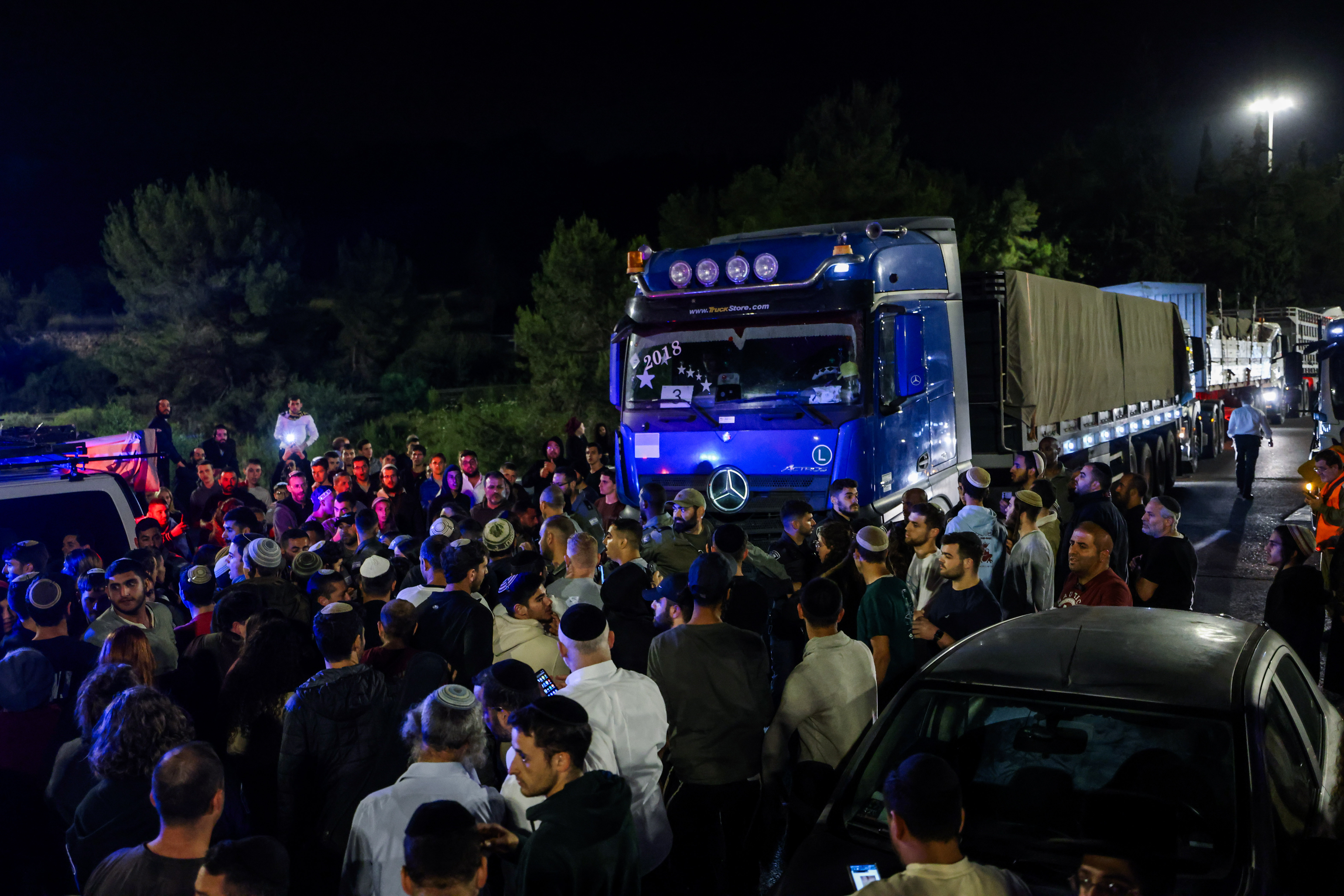The Threat of Militias Harm Democracy and the Stability of the State
A serious public and governmental discussion is needed regarding the privatization of internal security governance that we are currently witnessing, and its implications. This privatization threatens us all.

Photo by: Chaim Goldberg/Flash90
Last week, several video clips were made public showing a group of young men detaining truck drivers on the streets of Jerusalem and searching their trucks, seemingly with the aim of obstructing the implementation of the security cabinet decision to transfer humanitarian aid to Gaza. These video clips came on the heels of events in the last few weeks, in which groups of citizens attacked food trucks passing through the West Bank and destroyed their contents, to prevent aid from reaching the residents of Gaza. Though the video clips from Jerusalem do not show violence or destruction of food, the possibility of private citizens subverting the law in an organized fashion represents a no less dangerous phenomenon, which might undercut Israel’s identity as a democratic state.
These events, and the lack of enforcement measures against them, constitute a clear failing in the state’s obligation to maintain public order and safety and reveal the state’s very real difficulty in dealing with independent civilian action relating to internal security. In effect, the citizens seen in the video are using powers of search against other citizens and residents of the state and are briefly limiting their freedom of movement. It’s worth remembering that according to Israeli law, private individuals have no right to conduct searches of other persons. Nor are private individuals allowed to limit the freedom of movement of other persons in the public sphere except in very particular and severe conditions, which clearly do not apply in this case. In addition, public gatherings of citizens are forbidden if they are designed to terrorize other members of the public.
The organized group in Jerusalem did not emerge in a vacuum. This occurred in the context of the rise in documented cases of violence conducted against Palestinians in the West Bank recently, and reports about a lack of enforcement by security officials in response to this violence. But another piece of the context is the disaster of October 7, which left many Israelis with the feeling that they can no longer rely on the state to protect them, and they must take responsibility for defending themselves. This has led to a rise in admirable actions, such as widespread volunteering to serve in local police civilian defense squads. However, it also comes alongside worrying phenomena, such as the growth of independent groups of civilians who use policing powers on their own initiative and as they see fit, in accordance with their own rules. The possible consequences of the activities of such groups are even more severe when one takes into account the recent sharp increase in the number of firearms in public ownership.
These developments did not begin on October 7. In fact, what enables these groups of self-appointed police officers to operate without attracting public opposition is the fact that there are already a large number of security actors operating in the civilian sphere, many of them entitled to carry firearms. This “policing network” includes municipal policing, municipal security patrols, nonprofits with volunteers who hold private firearms licenses, security guards, and more. If we are willing to recognize that the Israeli national Police is no longer the only actor in the field of internal security, we can develop the appropriate effective tools for proper oversight of the other actors in the Israeli policing network, and prevent the existence of private militias.
We should not allow the large number of actors in the policing network to confuse us, and we should establish clear boundaries. In particular, it should be clear that there is no room for unofficial and independent groups acting in the field of internal security in Israel. This phenomenon is more serious than incidents in which an individual citizen takes the law into their own hands. Independent civilian groups directly threaten public order and challenge the authority of the state—and of the police as its emissary—to enforce public order and protect life and property. Even if Israel’s internal security doctrine needs updating, the Israel Police should remain the main actor in this arena.
The police must take effective action against independent civilian groups wherever these are formed, set clear boundaries via determined enforcement, and maintain constant communication with the public to explain these boundaries. Particularly at the current time, the police must not give the impression that it is avoiding addressing this phenomenon either for political reasons or due to fears about disapproval from the political leadership.
In the long term, a serious public and governmental discussion is needed regarding the privatization of internal security governance that we are currently witnessing, and its implications. This privatization threatens us all. First, as demonstrated by the video clips of truck drivers being searched by a group of citizens, it will harm those of us who are more vulnerable to begin with—minorities, women, and people living in poverty. And second, independent action of this kind may lead to the eruption of an internal front in the current conflict, with serious consequences for the State of Israel.
This article was published in the Jerusalem Post.
